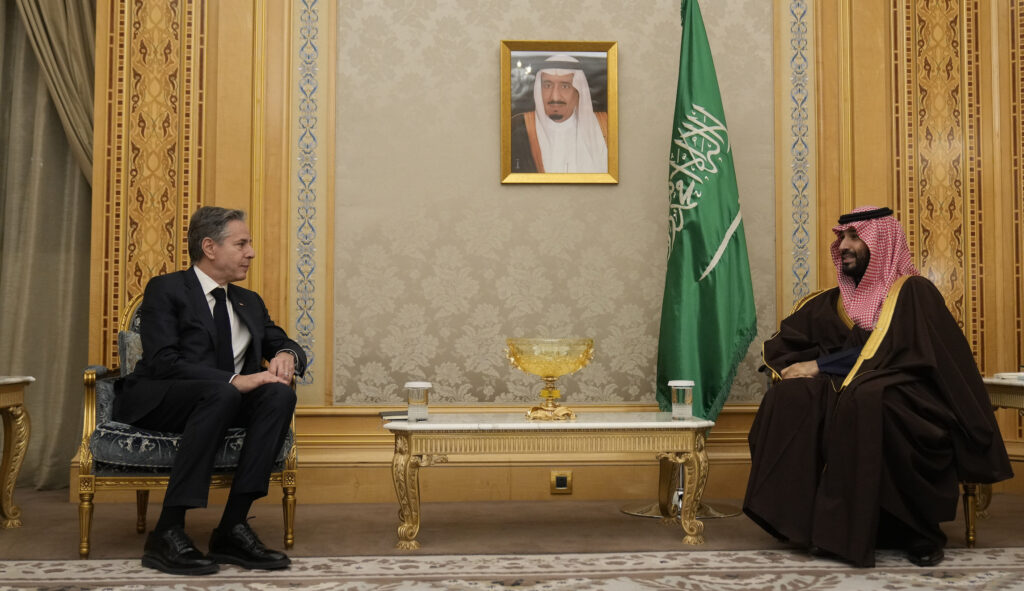Hamas has responded to the latest proposal from Qatar and the United States about a possible ceasefire and hostage release agreement with Israel, officials from both countries announced on Tuesday.
Qatari Prime Minister and Foreign Minister Mohammed bin Abdulrahman Al Thani and U.S. Secretary of State Antony Blinken acknowledged Hamas’s response during a press conference in Doha, Qatar, on Tuesday following a meeting but provided few details on what the response included. The deal had been submitted to the terrorist group more than a week ago.
“In general, it is positive. However, given the sensitivity of the circumstances, we will not tackle details. We are optimistic, and we have delivered the response to the Israeli party,” the prime minister said through a translator.
Blinken said it was “a serious proposal that was aimed at not simply repeating but expanding it” and noted he would be discussing Hamas’s response with Israeli leaders on Wednesday. The first deal lasted about a week and resulted in the release of 105 hostages who had been held in Gaza by terrorist groups since Oct. 7, though more than a hundred remain in the strip.
“There’s still a lot of work to be done, but we continue to believe that an agreement is possible and indeed essential. And we will continue to work relentlessly to achieve it,” he added.
The U.S. is hoping to see a pause in the fighting that would include the release of the hostages and allow for additional humanitarian aid to be surged into Gaza due to the devastating impact of the war.
Israeli leaders have said their intentions are to remove Hamas from power in Gaza, demilitarize it, and secure the release of the hostages, while Hamas has said it will not agree to another ceasefire deal unless Israel agrees to end the war, with it still in power, and to remove forces from the strip.
Blinken met with Egyptian President Abdel Fattah El-Sisi in Cairo, Egypt, earlier on Tuesday.
In both meetings, Blinken discussed the negotiations about agreeing to a cessation of the war. He also reaffirmed the U.S.’s “rejection of any forced displacement of Palestinians from Gaza and underscored the U.S. commitment to establishing durable peace in the Middle East, including the establishment of a Palestinian state that ensures security for Israelis and Palestinians alike,” State Department spokesman Matthew Miller said in a readout of the meeting with El-Sisi.
Miller said something nearly identical in a readout of the Blinken-Tamim bin Hamad Al Thani meeting. Blinken is set to meet with Israeli and Palestinian leaders on his trip as well.
President Joe Biden supports a two-state solution and believes lasting Middle East stability cannot be achieved without Palestinian statehood, though Israeli leaders, including Prime Minister Benjamin Netanyahu, have pushed back on the notion.
Prior to the Oct. 7 attack, which sent the region into chaos, the U.S. had been working on a historic normalization agreement between Israel and Saudi Arabia that has since been sidelined. The proposed agreement, in theory, would see the U.S. offer Saudi Arabia a defense treaty, assistance with a civilian nuclear program, and increased military sales in exchange for recognition of Israel’s sovereignty, while the Israelis would take concrete steps toward the creation of a Palestinian state.

National Security Council coordinator John Kirby told reporters on Tuesday that the “discussions are ongoing” and that they have “certainly received positive feedback from both sides that they’re willing to continue to have those discussions.”
On Monday, Blinken met with Saudi Crown Prince Mohammed bin Salman in Riyadh, Saudi Arabia, and in addition to discussing the war in Gaza, they discussed normalization efforts.
CLICK HERE TO READ MORE FROM THE WASHINGTON EXAMINER
Blinken said the crown prince told him that to support normalization, it would require “an end to the conflict in Gaza and a clear, credible timebound path to the establishment of a Palestinian state. So, we know the immense benefits that would come for everyone concerned with Israel’s further integration into the region, starting with the benefits for Israel. That’s something that Israelis will have to decide for themselves. And, again, all of this requires difficult, hard decisions, made all the more challenging given the focus on the conflict in Gaza.”
Blinken noted that pursuing normalization efforts “isolates those who reject it, starting with Iran.”
